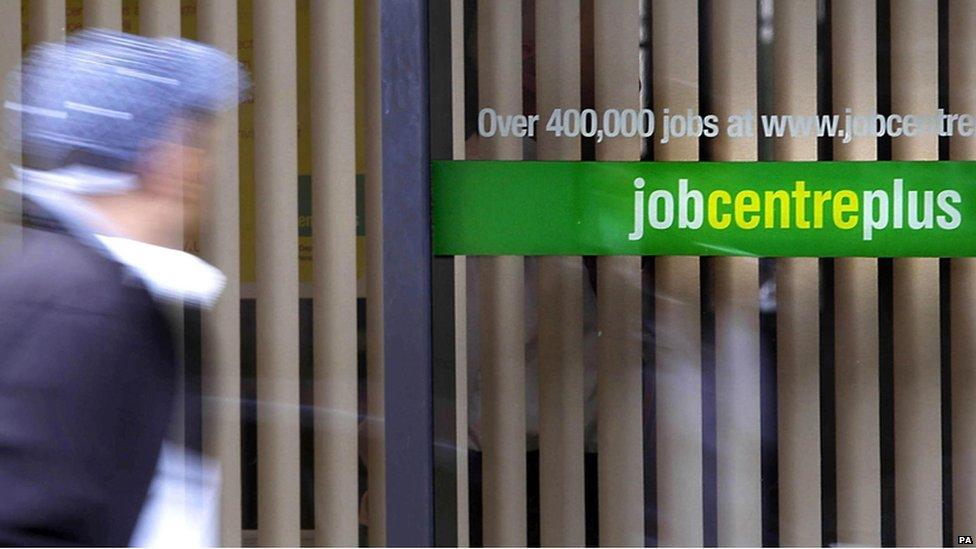Inequality is bad for growth, says OECD
- Published
- comments

It has been widely said, not least by ministers, that inequality reduced under the last government.
The official stats back that up - and the causes were largely a surge in benefit payments to those who lost jobs or whose income collapsed in the Great Recession, and the introduction of a new top rate of tax.
That 50% new top rate was announced by Labour in 2010, however, and reduced to 45% by George Osborne as Chancellor. So to be clear, the reduction in inequality wasn't a great cause championed by the coalition of Tories and LibDems and pursued with vigour by the adoption of novel policies.
What is more, a new study by the OECD, shows this narrowing of inequality was relatively short lived.
It says that in the UK, as measured by the so-called Gini coefficient and by the ratio of incomes of the top 10% of earners to the bottom 10%, inequality lessened between 2007 and 2011 and then increased again by 2013 (though not back to where it was in 2007).
Analysts such as the Institute for Fiscal Studies predict that, as a result of expected benefit cuts and reforms by the current government, the income gap between rich and poor will widen further in the coming few years.
What may matter as much as the trend is that the UK is shown to be a significantly less equal place than the average of rich developed countries.
So the average Gini score for 34 countries in its survey is .315, whereas the coefficient for the UK is a higher and less equal .351.
There aren't many rich countries with higher Gini scores than the UK. The US is the most important, with a .401 rating.
Switzerland, Sweden, the Netherlands, Germany and France all have much lower Gini scores. Even countries we think of as being similar to us in culture and economic approach, such as Australia, Ireland and New Zealand, have markedly narrower gaps between rich and poor than we do.
So the UK is among the less equal of the world's developed countries.
The 90/10 ratio, the multiple of earnings of the top 10% of earners versus the bottom 10%, tells a similar story - it is 10.5 for the UK, but just 6.6 for more egalitarian Germany.
That said, the ratio between top and bottom 10% is a staggering 18.8 for the US, or almost twice the OECD average of 9.6.
All that said, there is no need to flagellate ourselves that widening inequality here bucked the global trend.
Inequality may be more pronounced in the UK than elsewhere, but that gap between rich and poor has been widening almost everywhere.
As the OECD's report, external "In it together, why less inequality benefits all", says, an average 90/10 ratio of 7:1 for rich nations in the 1980s became 8:1 in the 90s to 9.6 today.
And what it argues - many will say persuasively - is that talking about worsening inequality is not to engage in the politics of envy, but to discuss economic failure or a big missed opportunity.
It says that the argument against inequality is about a good deal more than than the social and political costs, the damage to social cohesion. It purports to demonstrate that economic growth diminishes as the gap between rich and poor widens - so everyone suffers from worsening inequality.
The main theory it puts forward for why inequality and growth are negatively correlated is that poorer people invest less in their own education and self improvement - which is why its main anti-inequality prescriptions are government investment in skills and education, and a focus on a promoting better quality jobs.
Strikingly it isn't saying that the best way to greater equality and faster growth is to soak the rich. Instead it wants activism focused on raising the living standards of the poorest, especially the poorest 40%.
It calculates, therefore, that if living standards in the UK for poorer people were raised to the relative levels of France - that if so-called "bottom inequality" was reduced by half of a standard deviation (to use the jargon) - annual growth in national income or GDP would rise by 0.3% every year for 25 years.
That's not to be sniffed at. It would represent increasing our current growth rate by around 13%.
However, you may have noticed - in the perhaps unfortunate choice by the OECD of France as the comparator with the UK - that it is easier said than done to promote growth by reducing inequality.
Because it won't have escaped your notice that more equal France has been a slower growing economy than the UK's for some years (just as unequal America has been much faster growing than more egalitarian Japan).
Some would argue that the UK's putative economic success is due in part to a more deregulated economy, smaller welfare state and lower tax burden than in France - but those putative British virtues arguably tend to create the conditions for a widening in the gap between rich and poor.
Or to put it another way, there is a tightrope to walk here: inequality may be bad for growth and general prosperity, but the wrong kind of equality-promoting policies can also be toxic for growth and incomes.